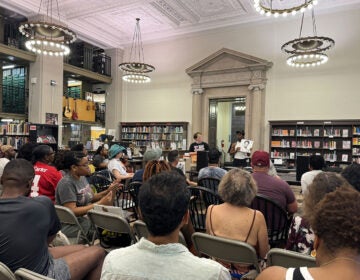Rethinking how we view Cliveden
Cliveden of the National Trust is poised to undergo a major change in character, programming, and audience in fulfillment of a recently changed mission.
Previously a sleepy antiquarian house museum, Cliveden has already taken substantive steps to become a community-centered cultural institution that uses history to help our neighbors learn about and cope with controversial issues.
This transformation was launched by the discovery that the Chew family, which occupied Cliveden from 1767 to 1970, was deeply involved in slavery from its inception until the passage of the 13th Amendment, and even beyond through a financial legacy that lasted into the 1960s.
This story is part of a larger history of both Philadelphia and the Mid-Atlantic region. This story’s lasting effects can be read in the inequality, poverty, and lack of opportunity we see in our Germantown neighborhood, which is more than 80 percent African American.
According to 2000 Census data, a quarter of our neighbors have incomes below the poverty level, and unemployment is pervasive, a situation that has not improved given the economic realities of the past several years. We have therefore chosen as our first priority to make history useful to understand the implications of Cliveden’s past and, it is hoped, promote greater racial harmony as we make connections between past and present.
Moving beyond battles and Chews
Cliveden has primarily interpreted its significance as the pivotal site in the 1777 Battle of Germantown and the history of the Chew family, and worked with other historic sites in Germantown to tell the story of the historic community in which the hosue sits.
A recent organizational and interpretive planning project for the consortium of 15 Germantown historic sites, of which Cliveden is a member, conducted stakeholder meetings to help clarify the roles and expectations for Germantown’s historic community.
As part of that project, the sites articulated four interpretive themes – the enduring search for freedom, hard work, acceptance of diversity, and beauty of nature and architecture – which provide context and a common interpretive message for the stories told at each individual site.
Cliveden led an implementation grant, “Germantown Works,” that coordinated programming among the historic sites and used an ambitious intergenerational program, “Germantown Speaks,” to gather information of how this historic community lived through segregation, Civil Rights and other recent history. The results suggest that the community is eager for us to keep the ball rolling in using history to make connections.
Tackling the tough topics
For the past six months a Heritage Philadelphia Program planning grant has allowed Cliveden to prepare for the changes necessary as we commit to interpreting the difficult history of slavery at a site that is unique in being able to tell the story of the War for Independence and the Struggle for Freedom. In a sense, expanding the story that Cliveden tells allows us to make the site more meaningful to the many different communities that may see their own history in Cliveden.
Over the summer, Cliveden used several facilitated retreats to marshal Board consensus, consider alternative strategies, consult with advisors and most important, conduct two different, highly successful and productive series of meetings and workshops with members of our community.
These “Cliveden Conversations” helped inform and engage members of the community, the museum field, and public officials in the neighborhood, the city, and the region while providing us with clear direction about what our audience wants and needs
First, people want to know the truth about what happened at Cliveden and the Chew Plantations—information that is still emerging from the legendary Chew Family papers, 200,000 documents stored at the Historical Society of Pennsylvania.
Second, they want to learn more about the real lives of individual enslaved people, including their suffering, their survival, and their resistance to authority. In addition, they want us to broaden our outreach, so more people can learn about what is happening at Cliveden and have access to the materials we continue to discover as the research proceeds.
Not an isolated challenge.
Cliveden’s change has its origins in the crisis facing historic sites across the country. A neighboring house museum, Upsala, went out of business and merged with Cliveden in 2004. House museums that are not relevant go away. While Cliveden/Upsala has been successful in generating more community use of the site (20,000 people served, but only 4000 visit the museum), the opportunity before us is to use historic content to continue building relevance for our organization.
And in a neighborhood as historic as Germantown, History can certainly play a leadership role in helping move the community forward. Please continue to check in with Cliveden as we plan to bring the stories and broader meaning of them to greater public use in the coming years.
Cliveden’s Chew House and historic battlefield are open for tours, April through December. 6401 Germantown Avenue – Philadelphia, PA 19144. 215-848-1777
WHYY is your source for fact-based, in-depth journalism and information. As a nonprofit organization, we rely on financial support from readers like you. Please give today.




